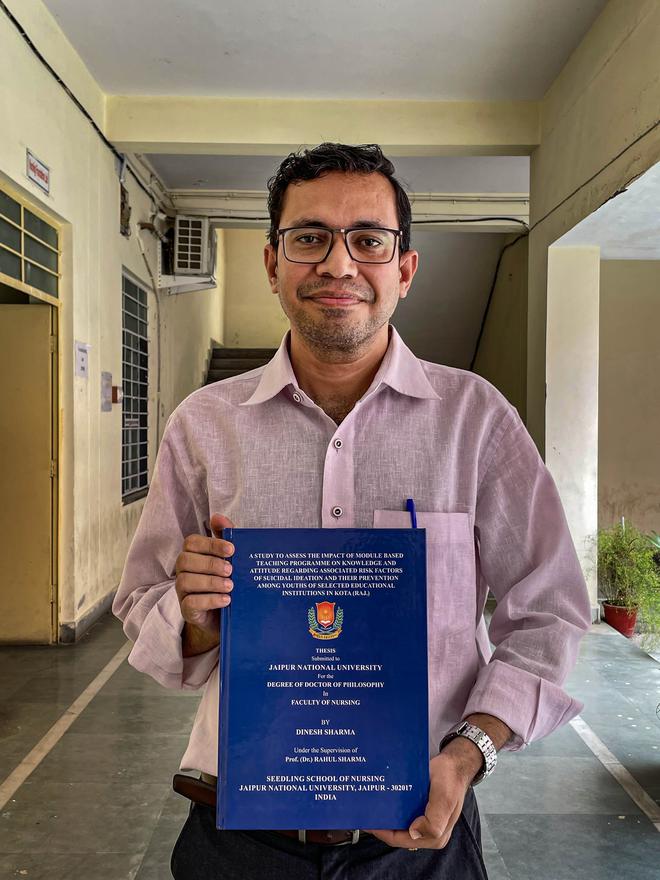Student suicides in coaching hub Kota have not just become a topic of debate for various stakeholders including politicians, institutions, police and parents but was also the subject of a psychologist's PhD research.
Dinesh Sharma, head of the psychology department at Government Nursing College in Kota, had counselled over 400 students taking coaching for engineering and medical entrance exams.
He decided to do his PhD on stress levels and different issues bothering students and pitched it to the Jaipur National University. He finished his PhD last month and has also submitted his thesis to the district administration which is experimenting with several measures to battle student suicides.
Twenty-three coaching students in Kota have ended their lives this year so far, the highest ever number. Last year, the figure was 15.
Mr. Sharma's thesis has several recommendations for the stakeholders to ensure students do not struggle with depression and do not feel compelled to take the extreme step.
"When I counselled the coaching students, I realised how this subject has never been studied in depth. Several measures have been attempted but they are just stopgap arrangements which are also not clearly working. I started researching on it and realised that barring few papers there is no published work on the subject and hence I decided to do the first PhD on the topic," Mr. Sharma told PTI in an interview.
"I reached out to coaching institutes and picked up 10 variables to conduct my study. The variables included age, gender, type of family the student belongs to — nuclear family or joint, type of residence — with parents, rented house or hostel, family history of depression or suicide and monthly family income. I interacted with students and tried to find out how any of these variables impacted the students and contributed to stress in them," he added.
Also Read | Worried about student suicides, grandparents, mothers on sabbatical shift to Kota with children
Over 2.5 lakh students move to Kota annually to prepare for competitive exams such as the Joint Entrance Exam (JEE) for engineering and the National Eligibility-cum-Entrance Test (NEET) for admission to medical colleges.
Mr. Sharma said he made three crucial recommendations in his thesis to control the tragic incidents. While two of them have not been tried before, the third one is being encouraged by the district administration too.

"My first recommendation is — there should be no ranking system at least in initial months of coaching in the fortnightly exams conducted by the institutes. Each mark less makes the students' rank slip... I also agree that it happens the same way in the main exam too but there is a long way to reach there and students can be mentally prepared slowly.
"Rather than awarding ranks, they can be awarded grades depending upon their marks. Like, students scoring above 90 per cent can get A+... this way the students will not feel pressured with each exam... I found during my research that majority suicides happened on the day the result of the fortnightly exam was announced," he said.
Mr. Sharma has also recommended that coaching institutes should charge fees on quarterly basis and not for the entire course.
"The institutes usually take complete fees in advance or two major installments. Two months later, if the student feels that he does not want to continue he cannot withdraw because parents cite economic burden. If fees are collected quarterly at least from the next quarter the student can drop out and will not continue to struggle just because money will go waste," he said.
The district administration has directed coaching institutes several times to refund fees smoothly if any student withdraws but the guideline remains far from implemented on ground.
Mr. Sharma's third recommendation is about not segregating students in different batches according to their scores.
"The practice of dividing students into these batches and giving an obvious push to the 'elite' batches such as Star or Enthusiast, is a demotivating factor for other students and often gives them a feeling of defeat. In an exam where every two marks deducted makes a students' rank slip by several hundred positions, giving this kind of mental conditioning to students is not a good idea. A very sharp student and a slightly less sharp student can study together as they can get motivation from each other," he added.
With the record spike in suicide cases, the administration has taken several steps including mandating installation of an anti-hanging device in fans and ordering coaching institutes to not take any exam for two months.
"Anti-suicide nets" are also being installed in balconies and lobbies of hostels in Kota to prevent students from taking any extreme step.
The Kota police is also roping in wardens, mess workers and tiffin service providers to look for any signs of depression or stress among the students staying in hostels and PG accommodation.







